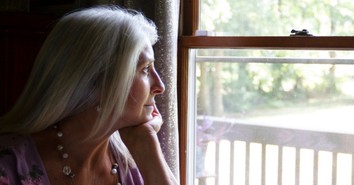Why Parents Should Think Twice Before Posting Family Moments Online

In the increasingly successful world of social media, an important question is being raised surrounding family vloggers and full-time influencers: Should parents include their children in their videos?
Family vlogging has become a popular trend in recent years, with families videoing and sharing their daily lives with a large audience. According to The Science Survey, viewing time of family vlogs increased by 90% in 2017 and continues to rise today. This new form of entertainment has amassed millions of views, but with it has come an ethical debate.
Apart from viral YouTube vloggers, Instagrammers, or TikTokers, what about the average person? Should they post videos of their newborn baby being adorable on their Instagram story or share their picture-perfect family Easter photos on Facebook? On one side of the debate are viewers who enjoy watching the sweet, innocent moments of a toddler laughing uncontrollably or saying their first words. It gives them a laugh and brightens their day. What could be so bad about that, anyway?
The disturbing and unfortunate reality is that there are people in our broken world who seek this content out specifically. Numerous family vloggers are being called out for exploiting their children or, in some cases, just one specific child (as opposed to the others that they shield from the media). Videos of their child doing innocent things are getting the most views and, scarily, the most saves. This means thousands of strangers are saving that video to watch later. As content creators have realized that their children get them millions of views and overnight success, they have started posting them more and more, some even taking themselves entirely out of the equation. They notice that posting their three-year-old in a swimsuit on the beach gets them the most views and engagement, resulting in them sometimes making thousands of dollars off a single post. What some argue is just the innocent capturing of a family moment is in reality appealing to an ill-intentioned, pedophiliac audience. Some parents are aware of this and do it anyway.
In one example online, a mom started vlogging her daughter and gained millions of followers almost overnight. She shifted from sharing content about her nursing career to solely making toddler vlogs about her daughter. She also has a son but made a video showing clear favoritism for him, which is why he is never shown on screen. He is protected.
In addition to the disturbing viewership those videos receive, children are being exploited and don’t have the ability to refuse participation. There is no chance for consent, and all these children will grow up having had their entire childhood years documented and publicized. In order to get the “perfect moment” captured, parents will have their kids reenact a conversion they had for the camera or pause in order to set one up. Imagine this: a teen is having insecurities or feeling lost and, in a moment of vulnerability, starts opening up to their mom or dad. Halfway through their deeply personal confessional, they look up and see that a camera has been hidden in the corner, recording the whole thing to later be posted as a ‘relatable parenting moment.’ If that happened to me, I would be crushed, embarrassed, and probably never open up again.
An article by The Science Survey explains this sad phenomenon well:
“One’s priorities can become extremely skewed when one’s family turns into one’s source of revenue. Parents utilizing their children’s emotions for content instead of comforting their children can teach these children that their feelings are not important, and these kids will not turn to their parents for comfort in the future. Family vlogging can deny children their agency, as sometimes, no matter how much they plead with their parents that they are upset and want to turn the camera off, their concerns are ignored.”
Those moments of connection that are meant to be protected and beautiful are becoming twisted. The safety that is supposed to be inherent in a parent-child relationship is completely lost. It is devastating to think about what personal traumas and issues these kids will have when they grow into adults. Parents are putting money and fame above a sacred relationship that God created for teaching, unconditional love, and safety.
So, how do we approach this topic as Christians? What does God call us to, both as parents and/or viewers?
1. Be Aware and Discerning
“What has been will be again, what has been done will be done again; there is nothing new under the sun.” Ecclesiastes 1:9
The first thing we can do is be aware that this is a problem. And in our ever-changing and evolving world, we can be sure that it will always be a problem until Jesus’ return. We live in a broken, sinful world that seems to get more sinister by the day. We need the Lord’s protection and wisdom as we check our own hearts and take action against the injustices happening around us. If you were unaware of online child exploitation, you may see things on social media differently now; if so, I think that is a good start.

Photo credit: ©GettyImages/FG Trade
2. Protect Your Children
“Lord, we ask for your watchful eye to be upon us, both day and night. Protect us from physical harm, illness, and the trials of life. Be our shield and refuge in times of trouble, and grant us the strength to face challenges with faith and courage. Guide us, O Lord, in all our decisions and actions. Illuminate our path with your divine wisdom and discernment. Help us to make choices that are in alignment with your will and purpose for our lives. May our actions be filled with love, kindness, and compassion towards one another and the world around us.” Taken from 15 Powerful Prayers for Protection of Your Family by Sue Schlesman
If you have a significant online presence and share your family without a second thought, I would urge you to consider the possible repercussions. There are many other options for how to still share your life without exposing young children to prying eyes:
-Make your account private so only selected family members and friends can view your pictures
-Blur out your children’s faces or get creative with pictures so they are present but not exploited
-Make photo albums on Google and share it with just your family
Before posting a picture or video, ask yourself if they would be embarrassed to see that as an adult. I have seen countless videos that are inappropriate, hurtful, or of a shockingly intimate parent-child moment. Even after people have deleted them, they will remain in a digital footprint forever. Technology is scarily advanced; viewers can take screenshots or screen recordings and have that captured forever on their devices. Always take an extra moment to consider if what you captured should be kept private out of respect for your child.
3. Seek Justice
“He has told you, O man, what is good; and what does the Lord require of you but to do justice, and to love kindness, and to walk humbly with your God?” Micah 6:8 ESV
“Give justice to the weak and the fatherless; maintain the right of the afflicted and the destitute. Rescue the weak and the needy; deliver them from the hand of the wicked.” Psalm 82:3-4 ESV
God’s Word clearly tells us we have a responsibility to seek justice. Throughout the Bible, we see that our Father loves children and would want us to protect the innocence of those who cannot stand up for themselves. Let’s not support parents online who have made a platform at the expense of their children without considering safety and consent.
Photo credit: ©GettyImages/monkeybusinessimages
Leah Arthur is the Family Editor of Crosswalk.com. She graduated from James Madison University with a B.A. in English and minors in Creative Writing and Writing, Rhetoric, and Technical Communication.
Originally published March 12, 2024.





